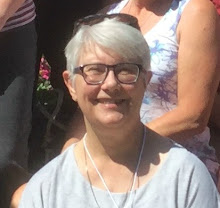One of the things about most of the writing that I do is that the articles/blog posts, etc., have a very narrow focus. Even Magic in the Water was focused on just one (broad) part of the weaving process. The sample collections were narrow in that they were about just one fibre. Blog posts, of course, are generally narrow because of their short nature - usually less than 1000 words.
Contemplating writing a book about everything I know about weaving? We are talking hundreds of thousands of words, very likely hundreds of pages. It's a daunting task, Herculean, really.
The overwhelming nature of the goal can seem, at times, impossible to accomplish. Beginning seems pointless because it starts to feel like it will never end.
But it is rather like weaving. To a new weaver a 10 yard warp seems like it is a huge thing and that they will never get to the end. But the end does come, and the warp does get woven. Only if the weaver sits down at the loom and carefully throws the shuttle, one pick at a time, though.
So it is with writing. The big difference is that in writing the set up is just the smallest part of the task. Writing an outline really doesn't take very long. The broad strokes are easily set down on a pad of paper or a spread sheet, or however one best handles that sort of information. For me, I like to see the relationships between the points so I tend to jot notes down and draw arrows, circle important things, number them for priority. But not everyone processes information that way.
But as I say, that's the easy bit. The hard part is elaborating on those topics, getting the correct information (lots of researching, checking various 'experts' to try to find a consensus - because none of those 'experts' hold opinions, right?), trying to organize my thoughts so that concepts are written down in an order that others can follow (a little like leaving a trail of crumbs for someone else to follow - or a thread like Theseus looking for the Minotaur).
As one becomes more 'expert' in a craft, it is easy to assume that others already know what you know. There is an assumption of a foundation of knowledge, especially in a craft that is so broad as well as deep. It is that very nature of illuminating the already understood that I hope to deal with - explore the subtleties involved, the layers of knowledge that only come with experience.
It is said that experience cannot be taught, only, well, experienced. But one can explain principles, make suggestions for variations, point out where things might need to be done differently so that people can recognize for themselves that, oops, here is an exception to the rule and something needs to change to accommodate it.
There is also all that underlying knowledge that people don't know they need to know and because they don't know it, they wind up with unsatisfactory results - choosing inappropriate materials being one of them. Not understanding the role that spinning plays in how yarns will behave. Why knitting yarns maybe aren't the 'best' choice for weaving in every situation and why they need to be handled a little bit differently if they are used. And so on. And on.
So much to say. So much desire to help others understand.
And that is why I am going to continue with this Herculean task. It won't be right away, even though I did make a start in Tennessee - 9 whole pages of single spaced text with 'holes' for information that needs to be added because I didn't have my resources to hand and need to look stuff up. Because while I may know a lot, I don't know everything. I don't hold all of this knowledge in my head. What I do know is how to consult an index. I do know that fact checking means consulting several sources because sometimes even an 'expert' gets it 'wrong' - or not entirely right. I know that because at times I am wrong, too.
And that is always a humbling but educational experience. Discovering that I am 'wrong' means that now I can be 'right'. That once again I have learned something new. Getting bumped out of a rut may not be comfortable, but comfort in all things at all times is, well, over rated, I think. Learning is much more interesting, much more exciting. I'm quite sure that as I go through the process of writing this (threatening to become a massive) missive, I am going to learn, and learn a lot. In fact, I already have.
Nine pages...and counting


























